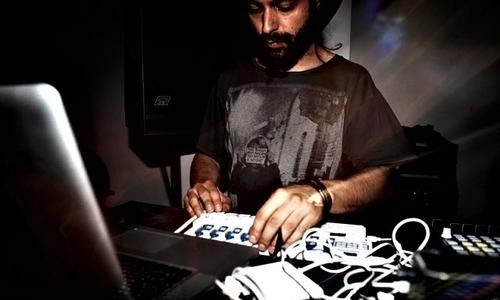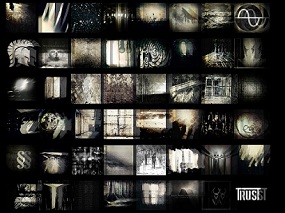Knowledge _ Interview with Dadub
Another thing I wanted to ask you about was in relation to the workshops that you run. When I saw that some artists that I admired on an influential record label were passionate about education, I was genuinely impressed. What was your thinking behind doing them?
Daniele: We got a few requests last year, one being in Pisa and the other in Moscow. Giovanni was teaching them, but we thought that it would be good to bring the experiment to Berlin. Behind it is the idea of not sharing our knowledge directly in terms of techniques, but rather we want to share our point of view on what we think about sound. For us it’s beautiful to share our knowledge. We don’t need to keep anything hidden as even if we tell you our techniques now, your sensibility will drive you to do something different. It’s our passion to share what we know. People were happy in the end with it.
Giovanni: One of the reasons why I also like to share my knowledge is because I’ve seen a lot of people complaining about music schools. You pay a lot of money and they give you all the theory, but in the end, they don’t really show how real producers do it. They don’t show which tricks or techniques they use to make their tracks. They don’t give you the real knowledge, they just tell you “the equaliser is this thing, and here are the algorithms, blah, blah, blah..”, but they don’t show you that Aphex Twin used this & that to make a certain track. So, I thought it would be great to have to possibility to hear my favourite producers explain to me how they built some sounds, or worked with arrangements or worked live. It’s a way of sharing the interesting things that we’ve managed to find out. It’s also a way to contribute to bringing the music forward.
During the 90’s, electronic music was really exploding, alive and fresh. Now I don’t really find a lot of new producers or people who manage to break already established structures or aesthetics. I feel that if more producers were to show what they do, people who want to get into music production would start at a level that is not just the basics. In 5 years they could be at the level where the big producers were 10 years before.
I don’t really understand why if you are a successful producer that you have to keep a secret of how you do something. There is nothing to be afraid of when sharing your knowledge. Life has a way of giving back what you share with people. Some people in the techno business are competitive and greedy. They think that if they share their knowledge that someone will make a track that sounds like their track and then it’s a competitor. I really don’t give a shit. I’m happy if people feel inspired by what I do and find what I do interesting. Simulation is a way for other people to say that you are doing something great and that they want to do something similar.
Daniele: The creative process and the sense of aesthetics affects the market that it’s sold in. I don’t agree with building your career or life in a specific way or in terms of a specific sound that you use. It defines your whole profile and what you are doing, however I can understand why someone will try to keep that knowledge hidden in the studio.
Our idea of sound depends on how we think. It sets us free.
Well, if you don’t mind, I’ll ask you something about production then. There’s a lot of distortion in your music. Do you have any advice on how to best manage distortion in a track?
Giovanni: Yeah, the most important thing is to use distortion in parallel. On sends, so that you don’t put the distortion directly on the track. Overlay the distortion onto the dry part. You basically keep the dry part as the functional side of the sound and add the distortion to the surface. It will keep the round bottom and the soft part, but you will add the distortion on top of it. This is especially important on bass, as If you add the distortion unit directly as an insert, then you risk destroying the fundamental harmonics of the bass. You will lose the bottom and it will not be punchy and warm any more.
Daniele: Another trick is to find your palette of distortion. We’ve got a huge family of different distortions. Each one has its own personality and flavour. When you get used to listening to different types of distortion, like digital, analog or whatever, you can use those distortions like colours. Maybe the same sound or same groups of sounds can be coloured by different kinds of distortion. Always use it in parallel because you can manage the intensity and the colour of what you want to give.
Giovanni: I like the D16 Devastator and the Audio Damage Kombinat 1..
Daniele: Yeah – Beautiful..
Giovanni: I have this Boss GS10. They made this hardware unit that contains all the pedals that it created in its history. You also have a USB connection, so that you can build your chain of effects with a plugin. We used it quite a lot, mainly for the synths on the album. I really like to use cheap stuff. I paid €100 for that haha. If you want to buy all the pedals that Boss have ever produced, you’ll spend nearly €2000. They stopped producing it immediately because they realised..
That it was a big mistake, yeah? hahaha
Giovanni: Yeah – hahaha



Hagbard Celine
Feb 24. 2013
Fantastic indepth interview with the guys. Loads of interesting comments and some very good technical tricks and tips. They have a great sound, and a hypnotic delivery of complex textures and rhythms that is communicated effectively in waves and layers of sonic information, direct in this piece, this interview should put most online publications to shame. Great stuff on a great act.
ICN
May 11. 2013
Hi Celine,
Only seeing your comment now. Thanks a lot for the kind words. They’re great fellas, arent they?
Cheers,
John
Ashley Borg
Feb 27. 2013
This is probably my fav ever written interview. Amazing levels of insight, I feel like I’m actually achieving a higher level of learning by reading alone. What’s really good is how their passion and personality come though, part of this must be attributed to the interviewer, who set an excellent tone, with his manner and questions.
5/5